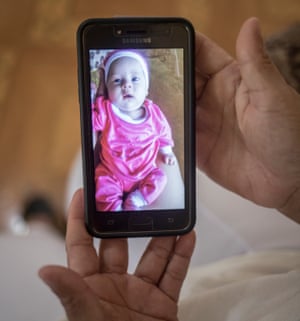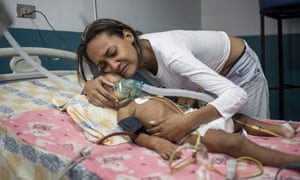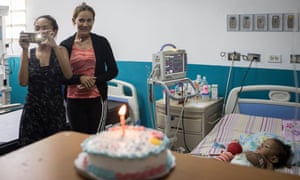'It's a pain you will never overcome': crisis in Venezuela as babies die of malnutrition
As Venezuela enters its seventh year of a crushing depression, doctors are seeing a rise in infant mortality rates due to deprivation
by Tom Phillips and Clavel Rangel in El Callao
Wed 12 February 2020
Her coffin was little larger than a shoe box. Her life had lasted three short months.
“She was a calm little thing,” the girl’s grandmother, Yamilet Zerpa, remembered as mourners filed into her sitting room to say their last goodbyes.
On a table before them lay a small white casket lined with sky blue cloth. Inside was Yaretzi López Pinto: born 14 October 2019, declared dead on Thursday 16 January this year.
Morticians had folded Yaretzi’s delicate hands over her chest and placed a pink flower on her fingers. Minnie Mouse smiled up from her dress beside the word: “Sweetheart”.
Less than 48 hours earlier Yaretzi had become the latest baby to fall victim to a merciless health emergency sweeping Venezuela – one that is exacting a particularly harsh toll on its youngest citizens.
“As a mum, it’s a pain that you will never overcome,” her shellshocked mother, Yangelis, mumbled as she prepared for her final farewell.
An unimaginable crisis
Infant mortality rates had been falling almost continuously in Venezuela since the 1940s – and almost halved in the 12 years after Hugo Chávez took power in 1999.
But as the oil-rich South American country enters the seventh year of a crushing depression critics blame on industrial-scale corruption, incompetence and mismanagement, doctors are seeing that trend reversed as deprivation-related cases of severe malnutrition condemn babies like Yaretzi to an early grave.
“It makes me sick,” said one of the doctors who had tried to save Yaretzi, wiping tears from their eyes.
The precise extent of the calamity is impossible to know.
Venezuela’s government has not published such figures since 2017, when an explosive health ministry bulletin revealed that 11,466 children had died the previous year – a 30% jump in infant mortality – before being purged from the internet.In an interview with the BBC last year, the president, Nicolás Maduro, denied a crisis, boasting Venezuela enjoyed “the highest levels of nutrients and access to food”.
“Do we have problems? Of course,” said Maduro, who blames Venezuela’s woes on an “economic war” being waged by Washington. “But Venezuela is not a country of famine.”
Those on the frontline of the crisis tell a different story.
In Bolívar, Venezuela’s largest state, doctors and social workers said they were seeing more and more severely malnourished children.
“There has been an incredible spike in malnutrition cases in the last one and a half or two years,” said one ER doctor who asked not to be named because of the politically sensitive nature of the emergency. “We have so many children suffering severe protein-calorie malnutrition.”
Carlos Hernández Acosta, a paediatrician in the state capital, Ciudad Bolívar, said the fact infant mortality rates were no longer falling was in itself a tragedy.
“But for them to be going up is unimaginable,” Hernández added.
“I feel profound anger. We shouldn’t be in this situation … It is just astonishing what has happened to this country.”
‘Mummy! My daughter! Mummy!’
Twenty-four hours after Yaretzi’s death, another child was fighting for her life in the paediatric emergency department of Ciudad Bolívar’s Ruiz y Páez hospital.
Luciannys Rivas, an 11-month-old girl, had been admitted five days earlier with amoebic dysentery exacerbated by malnutrition.
During that time, her 16-year-old mother, María Baeza, had watched three other children – among them Yaretzi – perish before her eyes, with malnutrition a key factor in all three deaths, according to doctors.
Now, it was María’s daughter whose life was on the line.
Doctors told her to wait in the corridor as they fed a central line into her screaming baby’s femoral artery.
Outside María fell to the ground and wailed. “Mummy! My daughter! Mummy!” she cried, clutching her 33-year-old mother, Alexandra, for support.
On the other side of the door, doctors raced to save Luciannys, who was dangerously dehydrated after more than 25 bouts of diarrhoea that day.
“She’s in pretty bad shape,” one doctor admitted as colleagues tapped on Luciannys’s cheeks to stop her slipping into unconsciousness.
To witness the almost unthinkable deprivation putting the lives of Venezuelan children at risk, drive two miles east from the hospital to an abandoned love motel called the Hotel Imperial where a dozen destitute families have made their homes.
There, in the wreckage of what was once Room 14, lives Yenni Galindo, a 29-year-old single mother of seven who is, somehow, raising her family on a monthly wage of just 800,000 bolívares ($11) – a little over one dollar per person per month.
None of Yenni’s children are in school – she cannot afford the uniforms – and she often struggles to feed them despite working as a cook in a local market.
Such hardship almost proved fatal.
Last July Yenni’s youngest child, eight-month-old Jesús, was rushed to the Ruiz y Páez hospital where he too was diagnosed with severe malnutrition and admitted for nine days. When he reached the ER he weighed 5.4kg (12lb) – far below the average of 8-10kg (18-22lb).
“It was awful. He was a chubby little kid and suddenly he became so weak. All skin and bones,” his mother said outside their dank room in the derelict motel.
Medical records suggest Jesús was suffering from marasmus, a type of malnutritioncaused by a general lack of nutrients. According to doctors, food shortages and hyperinflation have made the condition increasingly common in today’s Venezuela.
But doctors are also noticing more and more cases of another potentially fatal type of malnutrition called kwashiorkor, which causes swelling in the legs and face and is a result of the inadequate consumption of protein.
Doctors blame the growing prevalence of that condition on impoverished families feeding their babies rice cream or wheat flour, cornmeal or spaghetti mixed with water, instead of baby formula, which they cannot afford, or breastfeeding for which many malnourished mothers feel too weak.
Six months after his brush with death, Jesús is on the mend despite losing so much muscle mass that he has yet to walk.
“My dream is for them to be able to study and find work,” Yenni said of her seven children who share the same filthy mattress in the waterless hotel.
Yaretzi will never get that chance.
She was born in El Callao, an edgy gold rush town in Bolívar, on 14 October last year, along with a twin sister called Yaritzi.
Relatives say the sisters were born healthy, even if Yaretzi was slightly underweight at 2.2 kg (4.85lb).
Unable to afford baby formula – now far beyond the means of most Venezuelan families – Yaretzi’s mother and grandmother instead fed her rice cream. Deprived of the nutrients she needed to thrive, Yaretzi faded.
By the time she was admitted to the Ruiz y Páez hospital on the night of Sunday 12 January – limp, feverish and with a worryingly low haemoglobin count and a severe skin infection – Yaretzi stood little chance.
Doctors gave her a blood transfusion in the hope of saving her. But four days after being admitted, at around 11am on 16 January, Yaretzi’s short life came to an end.
“She didn’t make it,” her mother said as she tended to Yaretzi’s twin, just metres from the bed on which her sister had died.
Twenty-four hours later, Yaretzi’s fragile corpse was loaded into a green SUV and driven four hours to El Callao. A banner at an army checkpoint at the town’s entrance welcomed the dead girl back to the “land of hope and future” where she had been born just weeks earlier.
The next morning, as charcoal-coloured rain clouds hung low over the town, Yamilet stroked her granddaughter’s pale face for the last time and her tiny coffin was closed.
A three-car cortege set off for the town’s overgrown cemetery, where the graves are being swallowed up by weeds as tall as men. There, relatives improvised a tomb from breeze blocks and rusty sheets of corrugated iron, then stood in silence as Yaretzi was interred.
A twig was used to etch her name into the wet concrete. Her grandmother sat in a nearby car, too stunned to even cry.
Three days later, back at the hospital in Ciudad Bolívar, Yaretzi’s twin sister was gaining weight.
Luciannys, too, was bouncing back, her weight hitting 7.55kg (16.7lb) and her diarrhoea nearly under control.
“The good thing is she’s eating,” said Alexandra, as María hydrated her baby with a plastic syringe.
It was Luciannys’s first birthday and to celebrate hospital staff had brought her a pink and blue cake decorated with the face of Elsa, from the Disney animation Frozen.
For a moment all thought of Venezuela’s crisis receded, replaced by laughter, hugs and smiles. Residents sang Luciannys Happy Birthday and snapped selfies with the girl they had helped save.
But the doctor foresaw grim days ahead, as the recent dollarisation of Venezuela’s shattered economy made it even harder for such families to feed their children.
“Things will get worse,” the doctor predicted. “That is our prognosis.”







No comments:
Post a Comment